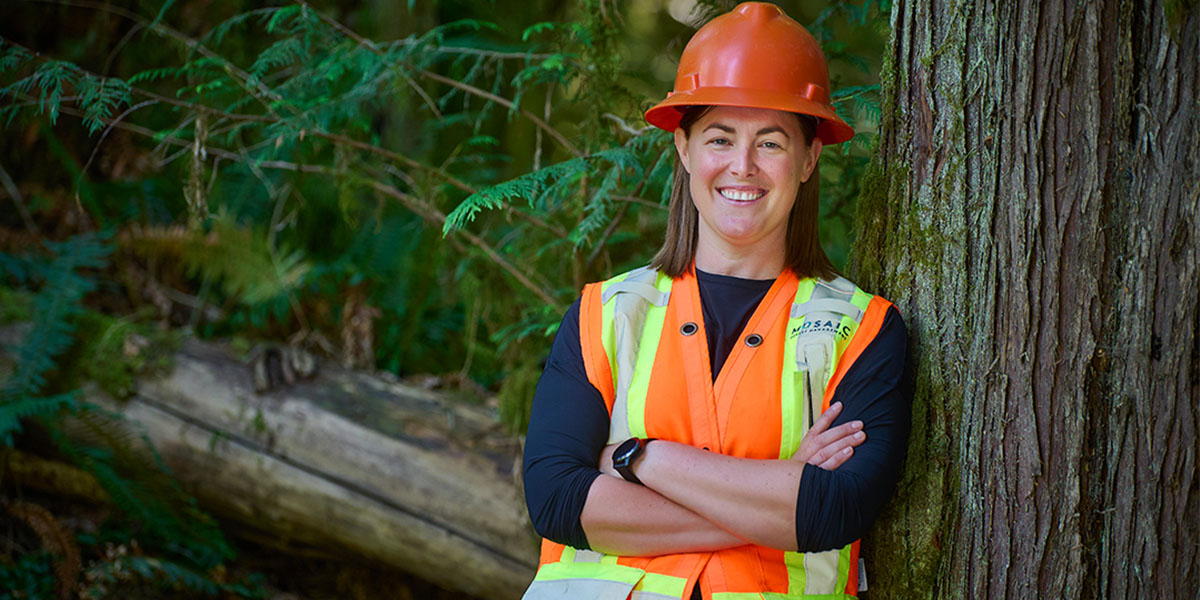From a tree planter nearly two decades ago to her new role as Vice President of Sustainability and Chief Forester at Mosaic Forest Management, Molly Hudson carved an uncharted path in an industry traditionally dominated by men.
“Being the first woman chief forester in our organization’s history has some symbolism to it,” shares Molly, who graduated from BCIT’s Renewable Resources – Forest Ecosystem diploma program (now called Forest and Natural Areas Management diploma program) in 2008. The alumna says that there weren’t many women in leadership roles in forestry when she began her career, and that she’s proud to use her new platform to inspire underrepresented people in the field.
“Our success as an industry hinges on having different voices at the table,” emphasizes Molly, adding that the sector is changing for the better, but there is more progress to be made.
In her new role, Molly says she’s equally passionate about sustainable forestry operations and advancing inclusivity: “Together, with a diverse and performance-oriented team, we’re clearing a path for forestry to evolve in terms of who’s in the industry and who’s making the decisions.”
Molly Hudson says Indigenous worldviews are integral to sustainable forestry
As a leader in sustainable forestry, Molly is responsible for resource and land management under a stewardship ethic that acknowledges long-standing societal needs for wood-based products. The forestry alumna shares that Indigenous people have operated with a stewardship ethic since time immemorial and that the future of the complex industry depends on Indigenous leadership and involvement.
“For the first time in the sector’s history, reconciliation is something we think about every day—it’s in everything we do,” explains Molly. “And that’s progress, but we’re still in the earliest stages.”
As catastrophic wildfires and other impacts of climate change continue to rise as a global concern, Molly says that the forestry industry’s close connection to the land both allows and requires it to adapt quicker than other industries, but that these adaptations must be accelerated.
Despite the major challenges of climate change, Molly, who says her organization’s goal is to be a positive climate contributor by 2035, sees opportunity for the sector: “Because we’re growing trees and offsetting emissions, we have the ability to have a net positive carbon balance.”
Molly shares that public perception is still catching up to the industry’s progress: “The forestry sector is highly dynamic and looks very different than it did 40 or even 20 years ago, which is a good thing.”
She says that ongoing conversations and ensuring people can access information that answers their questions will help address the perception gap.
From biologist to BCIT: Molly starts over in sustainable forestry
Growing up in a forested area outside of the small-town of Lillooet, BC, Molly says her upbringing influenced her strong community mindset and appreciation for the outdoors, both of which have been assets to her career.
Another beneficial quality Molly gained as a young person, is the desire to solve complex problems. She says this curiosity compelled her to want to become a scientist. But after three years of studying microbiology at university while working as a tree planter, she says that she realized the lab isn’t her happy place—the forest is.
“Tree planting integrated me into the tangible renewability and cyclical nature of forestry,” explains Molly, adding that this inspired her to pursue a formal education in forestry at BCIT after finishing her science degree at university in 2005.
Molly says she was drawn to BCIT for the opportunity to gain industry-relevant skills in an inclusive and hands-on two-year program: “I loved my time at BCIT. It did all that it promised and more for my career.”
In addition to being a tree planter, Molly has worked as a timber cruiser, research technician, and biologist before joining Mosaic 10 years ago.
Now, as someone who hires staff, Molly says that BCIT alumni stand out on a resume because she knows that the Institute’s assignments directly align with tasks that professionals see on the field. She says that she still uses the foundational skills that she learned at BCIT.
Giving back to future forestry changemakers
For Molly and her organization, giving back to BCIT students is fundamental to driving a strong, diverse workforce through high-quality education. Last year, Mosaic Forest Management was part of a combined $2.5 million donation through BCIT’s INSPIRE Campaign towards the new Trades and Technology Complex, which will provide trades students with next-generation training facilities.
Inspired to help BCIT students achieve their dreams? Learn how you can give back.
The sustainable forestry leader shares career advice for future professionals: “I’ve had many different jobs that ultimately led me to a place where I couldn’t be happier. But I wouldn’t have charted my career that way. Don’t pigeonhole yourself early on. Explore the industry and be flexible.”
Read more about alumni inspiring progress in their field:
